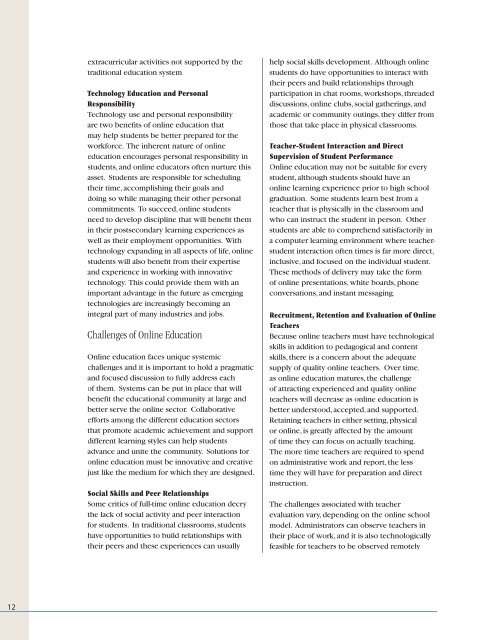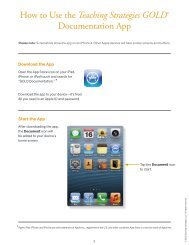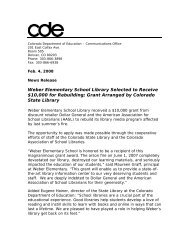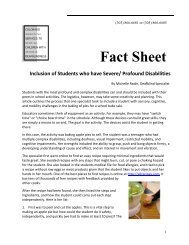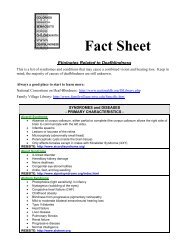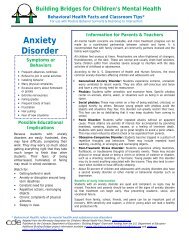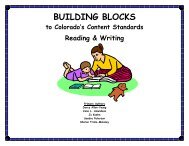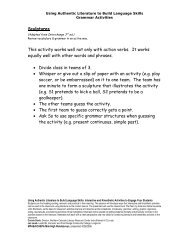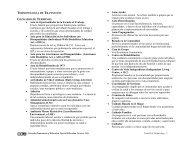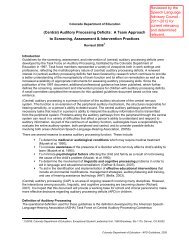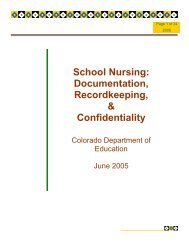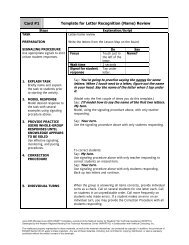ONLINE EDUCATION INTERIM REPORT - Colorado Department of ...
ONLINE EDUCATION INTERIM REPORT - Colorado Department of ...
ONLINE EDUCATION INTERIM REPORT - Colorado Department of ...
You also want an ePaper? Increase the reach of your titles
YUMPU automatically turns print PDFs into web optimized ePapers that Google loves.
12<br />
extracurricular activities not supported by the<br />
traditional education system.<br />
Technology Education and Personal<br />
Responsibility<br />
Technology use and personal responsibility<br />
are two benefi ts <strong>of</strong> online education that<br />
may help students be better prepared for the<br />
workforce. The inherent nature <strong>of</strong> online<br />
education encourages personal responsibility in<br />
students, and online educators <strong>of</strong>ten nurture this<br />
asset. Students are responsible for scheduling<br />
their time, accomplishing their goals and<br />
doing so while managing their other personal<br />
commitments. To succeed, online students<br />
need to develop discipline that will benefi t them<br />
in their postsecondary learning experiences as<br />
well as their employment opportunities. With<br />
technology expanding in all aspects <strong>of</strong> life, online<br />
students will also benefi t from their expertise<br />
and experience in working with innovative<br />
technology. This could provide them with an<br />
important advantage in the future as emerging<br />
technologies are increasingly becoming an<br />
integral part <strong>of</strong> many industries and jobs.<br />
Challenges <strong>of</strong> Online Education<br />
Online education faces unique systemic<br />
challenges and it is important to hold a pragmatic<br />
and focused discussion to fully address each<br />
<strong>of</strong> them. Systems can be put in place that will<br />
benefi t the educational community at large and<br />
better serve the online sector. Collaborative<br />
efforts among the different education sectors<br />
that promote academic achievement and support<br />
different learning styles can help students<br />
advance and unite the community. Solutions for<br />
online education must be innovative and creative<br />
just like the medium for which they are designed.<br />
Social Skills and Peer Relationships<br />
Some critics <strong>of</strong> full-time online education decry<br />
the lack <strong>of</strong> social activity and peer interaction<br />
for students. In traditional classrooms, students<br />
have opportunities to build relationships with<br />
their peers and these experiences can usually<br />
help social skills development. Although online<br />
students do have opportunities to interact with<br />
their peers and build relationships through<br />
participation in chat rooms, workshops, threaded<br />
discussions, online clubs, social gatherings, and<br />
academic or community outings, they differ from<br />
those that take place in physical classrooms.<br />
Teacher-Student Interaction and Direct<br />
Supervision <strong>of</strong> Student Performance<br />
Online education may not be suitable for every<br />
student, although students should have an<br />
online learning experience prior to high school<br />
graduation. Some students learn best from a<br />
teacher that is physically in the classroom and<br />
who can instruct the student in person. Other<br />
students are able to comprehend satisfactorily in<br />
a computer learning environment where teacherstudent<br />
interaction <strong>of</strong>ten times is far more direct,<br />
inclusive, and focused on the individual student.<br />
These methods <strong>of</strong> delivery may take the form<br />
<strong>of</strong> online presentations, white boards, phone<br />
conversations, and instant messaging.<br />
Recruitment, Retention and Evaluation <strong>of</strong> Online<br />
Teachers<br />
Because online teachers must have technological<br />
skills in addition to pedagogical and content<br />
skills, there is a concern about the adequate<br />
supply <strong>of</strong> quality online teachers. Over time,<br />
as online education matures, the challenge<br />
<strong>of</strong> attracting experienced and quality online<br />
teachers will decrease as online education is<br />
better understood, accepted, and supported.<br />
Retaining teachers in either setting, physical<br />
or online, is greatly affected by the amount<br />
<strong>of</strong> time they can focus on actually teaching.<br />
The more time teachers are required to spend<br />
on administrative work and report, the less<br />
time they will have for preparation and direct<br />
instruction.<br />
The challenges associated with teacher<br />
evaluation vary, depending on the online school<br />
model. Administrators can observe teachers in<br />
their place <strong>of</strong> work, and it is also technologically<br />
feasible for teachers to be observed remotely


